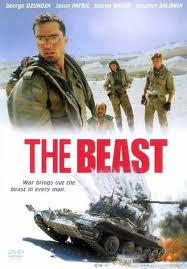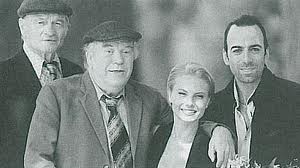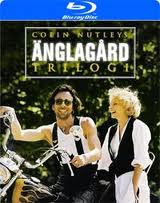"When you're wounded an' left on Afghanistan's plains
An the women come out to cut up your remains
Jus' roll to your rifle an' blow out your brains
An' go to your Gawd like a soldier."
-Rudyard Kipling
"Those that fail to learn from history are doomed to repeat it."
-Winston Churchill
Sorry in advance for this, but before I get to the movie review, a little history lesson is in order...
I was just finishing up my first semester in college in late December of 1979 when the Soviet Union invaded Afghanistan in support of its unpopular communist regime. Opposition tribal groups within Afghanistan, known as the Mujahideen, banded together to fight the invading Russian army. The US provided assistance to these groups through the Pakistani intelligence services in a program called "Operation Cyclone". The Mujahideen were also aided by foreign Muslims from around the world, the so-called Afghan-Arabs, one of whom, Osama bin Laden would form Maktab al-Khidamat, aka the Afghan Services Bureau, with Abdullah Azzam. Branches of this organization were created around the world, including 33 in the US to help fund the opposition forces in Afghanistan. Osama bin Laden would eventually split off from Maktab al-Khidamat and form al Qaeda.
And as Paul Harvey would say "...now you know the rest of the story."
Right off the bat, I have to say I love this film, but I have to address the elephant in the living room up front that could take some out of it immediately. Now I don't know if it was director Kevin Reynold's decision in The Beast of War to have an American cast play the Soviet tank crew, and to have them speak perfect, accent-less American English, but it does give the film a weird prescience considering it was made in 1988 thirteen years before the American invasion. Unintentionally highlighting the very American-ness of the crew even more is Cuban-born, Steven Bauer's solid performance as a tribal khan who speaks a very believable Pashto. Why have authentic sounding Mujahideen portrayals complete with subtitles, but not realistic Russians? I can only think of two reasons, one is for a purely marketing reason (but then why have any character speak another language?), or maybe there was an artistic statement behind it. Afghanistan was considered the Soviet Union's Vietnam. Was Reynolds making this point using American actors? Or maybe he's just clairvoyant. Seems a bit of a stretch, but in the end, it really didn't prove that much of a distraction for me, but I can see how it could take people out of the film, not to mention that America has since entered Afghanistan which really adds some irony to the casting. But if the cast doesn't take the viewer out, the other aspects of the film will certainly attract and hold attention.
Synopsis - A lone Soviet T-55 tank gets lost in Afghanistan after destroying a village. A small group of Afghans pursue it to exact retribution.
The simplicity of the story, the breakneck pacing and the plot twists really drive this movie and keep me on the edge of my seat like few films can. Peter Boyle, a frequent editor for director Kevin Reynolds, ticks between story and character like a well calibrated metronome, never lingering too long with characters or fatiguing the viewer with non-stop action. There's just enough of the characters to care and then just enough action to keep up the suspense and move the story along briskly. It's surprising how many films can't achieve this balance, but The Beast of War executes it very well. So well in fact, this is one of the rare movies that I can't stop watching once I start.
Credit the script as well which not only has the cat and mouse aspects, but tension within both the opposing groups, plus a strong anti-war, pro-tolerance message. It's hard to believe a film as action oriented and suspenseful is based on a play, but it was (Nanawatai by William Mastrosimone), and some of the character dialogue and related themes of mercy, revenge and idealism do peak through on several occasions especially in conversations between the protagonist tank driver Koverchenko and Afghan ally Samad. Blind nationalism is also embodied in the tank commander, played by the excellent George Dzundza, who makes Patton look like a hippy. At times the themes get delivered a little too heavy-handedly as when Koverchenko asks the tank commander "How is it we're the Nazis this time?". Overall though, the message doesn't get in the way of what is a top-notch action/revenge tale.
I was just finishing up my first semester in college in late December of 1979 when the Soviet Union invaded Afghanistan in support of its unpopular communist regime. Opposition tribal groups within Afghanistan, known as the Mujahideen, banded together to fight the invading Russian army. The US provided assistance to these groups through the Pakistani intelligence services in a program called "Operation Cyclone". The Mujahideen were also aided by foreign Muslims from around the world, the so-called Afghan-Arabs, one of whom, Osama bin Laden would form Maktab al-Khidamat, aka the Afghan Services Bureau, with Abdullah Azzam. Branches of this organization were created around the world, including 33 in the US to help fund the opposition forces in Afghanistan. Osama bin Laden would eventually split off from Maktab al-Khidamat and form al Qaeda.
And as Paul Harvey would say "...now you know the rest of the story."
Right off the bat, I have to say I love this film, but I have to address the elephant in the living room up front that could take some out of it immediately. Now I don't know if it was director Kevin Reynold's decision in The Beast of War to have an American cast play the Soviet tank crew, and to have them speak perfect, accent-less American English, but it does give the film a weird prescience considering it was made in 1988 thirteen years before the American invasion. Unintentionally highlighting the very American-ness of the crew even more is Cuban-born, Steven Bauer's solid performance as a tribal khan who speaks a very believable Pashto. Why have authentic sounding Mujahideen portrayals complete with subtitles, but not realistic Russians? I can only think of two reasons, one is for a purely marketing reason (but then why have any character speak another language?), or maybe there was an artistic statement behind it. Afghanistan was considered the Soviet Union's Vietnam. Was Reynolds making this point using American actors? Or maybe he's just clairvoyant. Seems a bit of a stretch, but in the end, it really didn't prove that much of a distraction for me, but I can see how it could take people out of the film, not to mention that America has since entered Afghanistan which really adds some irony to the casting. But if the cast doesn't take the viewer out, the other aspects of the film will certainly attract and hold attention.
Synopsis - A lone Soviet T-55 tank gets lost in Afghanistan after destroying a village. A small group of Afghans pursue it to exact retribution.
Credit the script as well which not only has the cat and mouse aspects, but tension within both the opposing groups, plus a strong anti-war, pro-tolerance message. It's hard to believe a film as action oriented and suspenseful is based on a play, but it was (Nanawatai by William Mastrosimone), and some of the character dialogue and related themes of mercy, revenge and idealism do peak through on several occasions especially in conversations between the protagonist tank driver Koverchenko and Afghan ally Samad. Blind nationalism is also embodied in the tank commander, played by the excellent George Dzundza, who makes Patton look like a hippy. At times the themes get delivered a little too heavy-handedly as when Koverchenko asks the tank commander "How is it we're the Nazis this time?". Overall though, the message doesn't get in the way of what is a top-notch action/revenge tale.
Other strong attributes of the film are the soundtrack, by Mark Isham, which alternates between haunting and pulse-pounding, the Israeli geography which provides an excellent stand-in for Afghanistan's Kandahar region and Dale Dye's on-point military assistance and advice which always brings verisimilitude to any given war film he's involved in. Also, director Reynolds did some superior work camera-wise which really enhanced the suspense and helped bring clarity to the proceedings.
As for the flaws of the film, well, I guess that depends on how you feel about Jason Patric. I thought he was quite serviceable in this, but he is off-putting to some. Speaking of off-putting, Stephen Baldwin (blech) does have a small role as a cowardly member of the tank crew, but is mercifully limited in screen-time and importance. In short, he is quite easily ignored. As mentioned, Dzundza and Steven Bauer are both quite good in their roles, as is Chaim Girafi who plays Bauer's bad-ass, scavenger cousin Moustafa. Again, if you can get past some of the casting decisions, it's a very good, suspenseful action movie.
Badal!
Score 7.5/10















